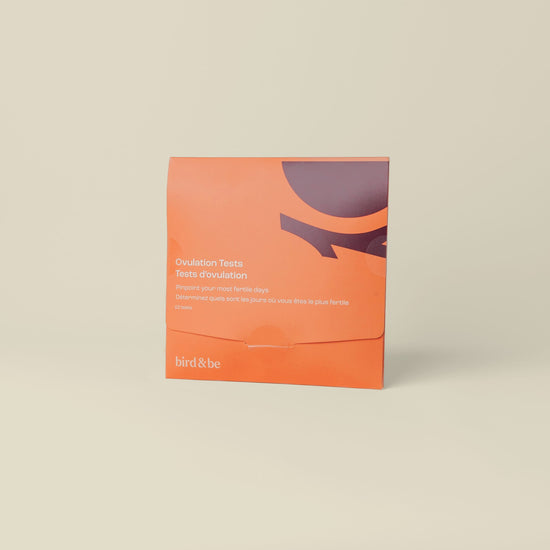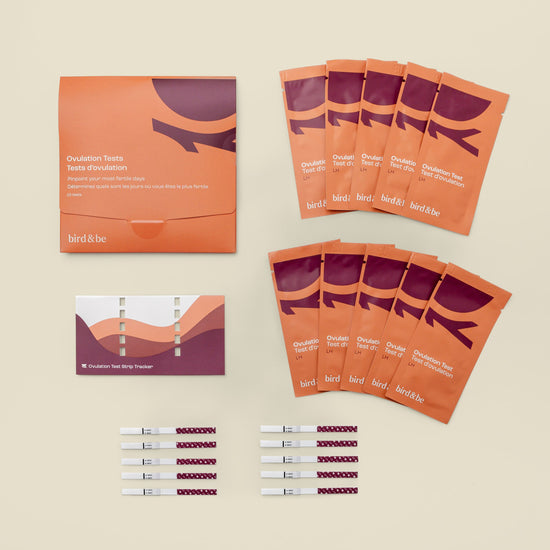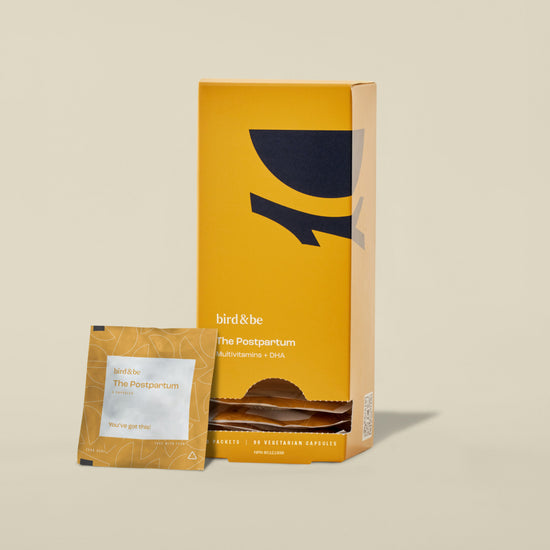The first year postpartum comes with a lot of changes, but what is considered normal, and how long do things like hair loss and vaginal changes last for? Let’s take a closer look at what to expect postpartum and answer your postpartum questions!
When does postpartum hair loss start and how long does it last?
Your hair may have been full, thick and luscious during pregnancy, but the change in your hormones postpartum—including a big drop in estrogen—can have you shedding hair at an alarming rate. You may notice more hair lost in the shower, more accumulating in your hairbrush, and in some cases the hair left on your head may seem a bit thinner in areas. These are all natural and normal changes postpartum as the hair follicles on your scalp go from growth and resting phases to the shedding phase.
Postpartum hair shedding can start about two to four months after giving birth, and it can last up to six months. Although losing your hair can be distressing, it’s temporary and should stop by the time your baby is one-year old. In the meantime, take good care of your remaining hair (and the little baby hairs that will start growing again) by using a gentle volumizing shampoo and conditioner (look for ones labeled “for fine hair”) and avoid using high heat.
How long does postpartum bleeding last?
Regardless of how you gave birth (vaginal or surgical), the uterus has to shed its lining once baby is no longer living there. You may notice a blood-streaked discharge, or bloody tissue (called lochia) that resembles a menstrual flow for a few days to about two weeks postpartum. In some cases, it can last six weeks—by this time it should be spotting and not a full flow. You may also notice changes in lochia over time, starting as a dark or bright red, transitioning to a pink or pinkish-brown discharge, and in its final stage lochia can be brown, yellowish or white.
To reduce the chance of an infection, avoid tampons during this time and instead opt for sanitary pads or panty liners. If you notice any greenish discharge or any bad smells (unlike that of normal menstrual flow or discharge), give your doctor a call.
How long can postpartum depression last?
Postpartum Depression (PPD) is a clinical diagnosis of Major Depressive Disorder or Bipolar Disease that starts within the first four weeks postpartum. Studies suggest that about 36 percent of mothers with PPD will still experience the disorder at six months postpartum, and six to 39 percent still qualify as having PPD a year after giving birth. However, it is very possible for PPD to last longer. If you’re noticing excessive feelings of guilt, worthlessness, thoughts of death or suicide, feeling agitation, and have been experiencing issues with sleep, energy levels or concentration, see your doctor as soon as possible and have yourself assessed for PPD.
Learn more about the signs and symptoms and symptoms of Postpartum Depression.
What happens at your six-week postpartum appointment?
If you’re under the care of a midwife, you’ll have an in-home visit from your midwife within 24 to 36 hours after giving birth. They’ll check on breastfeeding progress, measure baby’s weight and check for maternal bleeding. You’ll have another visit between days five to seven, and another one between days 10 to 14. Your midwife can assess your baby’s growth, how well baby is feeding (and help with breastfeeding if you’re struggling). They also check for new onset jaundice, check the health of the vaginal tissues (especially if you’ve had a tear, an episiotomy or needed any stitches). Follow up appointments in those first few weeks can also be used to assess your mental health and screen you for postpartum depression.
If your care is with an obstetrician, your newborn will still need to be seen regularly in the first few days and weeks of life, but you’ll likely need to coordinate these visits with a family doctor or pediatrician at their office (and they’ll check all the same things that a midwife does when it comes to baby’s health). When it comes to your own health, some family doctors will check up on you as well—asking about how you’re healing and any PPD-related symptoms. But you likely won’t have a more thorough check-up until six weeks postpartum. Since this is quite a long time post-delivery, it should be an appointment with a physical examination and mental health screen. At this point, you’ll also find out if you have the green light to start having sex and exercising again.
This doesn’t mean that you must wait six weeks to see a doctor if you think something is wrong. If you’re having difficulties with breastfeeding, suspect you may have Postpartum Depression, or even if something just doesn’t seem right to you, don’t wait. Call your doctor’s office and have someone check in on you sooner. You might not get a home visit like with a midwife, but it’s important to be seen by a healthcare practitioner when you need them. If you can’t get in to see your OB, try your family doctor or a nurse practitioner. You can also reach out to a lactation consultant for additional breastfeeding support (some require a referral from a doctor or midwife, while others you can self-refer to), or a postpartum doula who can provide emotional and physical support in these early days and weeks.
When can you have sex after giving birth?
The idea of having sex after giving birth may make you nervous or excited. Even if your libido is ramped up, you’ll want to wait at least two weeks after giving birth to have sex to reduce the risk of infection—but most healthcare practitioners suggest waiting until four to six weeks postpartum. This timeline will also depend on the state of the vaginal tissue including any tearing, stitches or scar tissue.
It’s not uncommon to notice vaginal irritation or pain when you do start to have sex again, so take it slow. Make sure you’re feeling ready and get the green light from your healthcare practitioner. Pelvic floor physiotherapy is another great tool to help improve pelvic tone and health post-pregnancy. You will also want to consider contraceptive methods since it’s possible to get pregnant postpartum, even if your cycles haven’t resumed and even if you’re breastfeeding. (TLDR: breastfeeding is not adequate birth control.)
When can you try to conceive again after giving birth?
It’s possible to get pregnant as early as one month postpartum, but whether you should try to conceive soon after giving birth should be carefully thought out. Information from global health agencies, including the World Health Organization (WHO) suggest waiting at least 12 months postpartum before conceiving again, especially if you’re breastfeeding.
Pregnancy and breastfeeding both require a great amount of nutrients. Although it’s possible to be pregnant while breastfeeding, your body’s energy and nutrient needs to accommodate both are significantly higher. This can increase the risk of undernourishment in both mom and baby, leading to maternal anemia and issues with fetal growth. Pregnancies that occur within 12 months of giving birth are also at a higher risk of maternal and infant health issues including stillbirth, preterm birth, low birth weight, and small for gestational age babies. How much risk is there? If you were to become pregnant while exclusively breastfeeding, the risk of miscarriage would be the same as if you were to conceive at the age of 40 or older.






